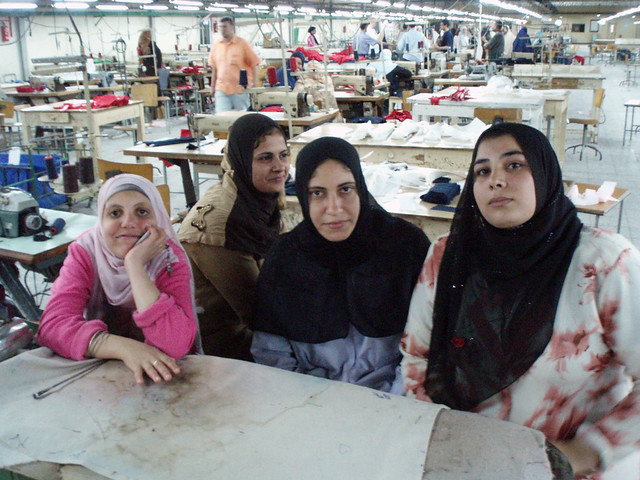I received more details about the agreement struck yesterday at the parliament between the parties involved in the Mansoura-España Gamrnets Company crisis.
The agreement to be in effect starting today, was brokered in a meeting that included: Hussein Megawer, the head of General Federation of Trade Unions, Muhammad Adel el-Sanhoury and Haitham Ahmad Atef of the United Bank, Nahed el-Ashry of the Labor Ministry, Said el-Gohary, the head of the General Union of Textile Workers, and head of the Factory Union Committee Hamdi el-Maghrabi and his deputy Adel Hassaballah.
1- The workers’ May salaries will be paid today. The June salaries will be paid next Thursday.
2-The May Day grants from 1 July 2006 to 31 May 2007 will be paid today (LE10 per month = LE110 for each worker)
3-The social bonuses for the year 2006 will be paid, with a minimum LE30… Moreover it will be paid to all workers, whether they have contracts or not.
4-(MORE IMPORTANTLY) The Company WILL NOT BE LIQUIDATED. The United Bank pledged work will continue in the factory. If the bank fails to pump investments into the company and decides to sell it, the selling agreement must include guarantees from the new investor to keep the company going without firing a single worker, or cutting (the already ultra-low) the workers’ salaries. This means the bank cannot sell the company, as rumoured, to the neighboring Delta Academy as a real estate property to be razed.
5-No worker who took part in the industrial action will be victimized. The sacking decrees given to trade unionist Mohsen el-Sha’er and the five women workers are revoked.
6-A committee, headed by Hussein Megawer, has been formed to supervise the implementation of the agreement including the officials, managers and trade unionists who were present in the parliamentary session. This committee will also look into the rest of the workers’ demands that have to do with the unpaid bonuses and May Day grants (now prior to 2006).
The workers in the factory are expected to disband their sit-in today, after they receive their May salaries. “We are optimistic this time,” a worker told me over the phone. “We are happy there will be no victimization, and that the company will continue. Where else would we have gone? The street? The management now knows what we are capable of. We will disband the sit-in after we get paid tomorrow (i.e., Thursday). If they don’t give us the rest of our rights we will occupy the factory again.”
MABROUK for the Mansoura-España workers! Mabrouk for the women workers who were braver and more militant than their male colleagues throughout those two months. Mabrouk for those who want to see the women of our country empowered in the social and economic spheres. The women’s struggle at that factory was a clear proof that the fight for the liberation of women is not a fight to take away the veil or the niqab. Virtually all the women in the Talkha factory were veiled and few were in niqab, but they left their families and slept outside their homes, sharing one roof with their male colleagues, which is a bloody TABOO for women in Egypt, even those upper-class secular feminists in Cairo. It’s not about that bloody piece of cloth (though I support neither of the veil nor the niqab), but I’m not gonna waist my time debating those liberal feminists over that question.. they can go to Farouk Honsi instead and he’ll be all ears… Ya Farouk, you who equated the veil with backwardness, can you see what the veiled women in Mansoura-España did? Was that backwardness? The source of backwardness in this country are people like you, Suzan and the National Council of Women who have reduced women’s liberation to the Rotary and the Cairo Capital Club meetings, Shame on you!
The workers in the Mansoura-España factory would like to send their warmest regards to all the journalists and activists who stood by them. And they ask you to keep an eye on the factory, lest the United Bank betrays the agreement.
Now those women can go back to their homes, with their heads up high, they have gone through so much hardship, but they won.
Can we expect women who were definitely toughened by that experience to accept abuse when they go back to their husbands and families? Will they, let’s say, get slapped on the face now, and stay silent?! I’m willing to bet on anything that those women’s lives have changed by 180 degrees, thanks to their struggle at the factory.
If a woman managed to stay in a factory for that long, resisting intimidation from the government, the management, the police, and social stigmas, would she just go back home to the same old shit!? Hell no! The only way to empower our country’s women are these joint struggles from below.
Mabrouk! Mabrouk! Mabrouk!
